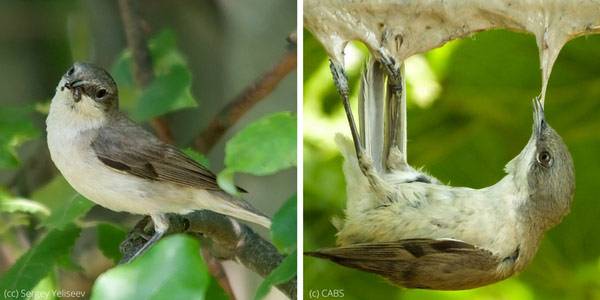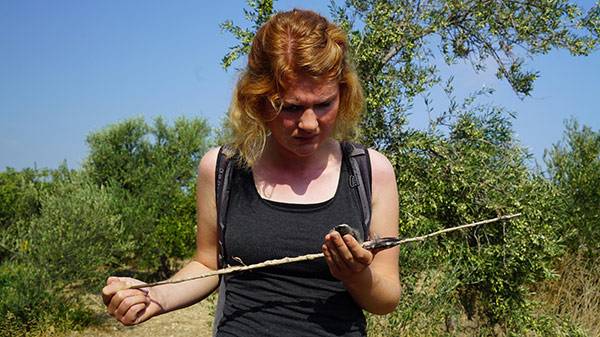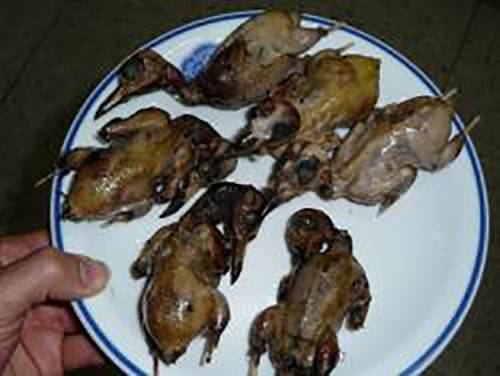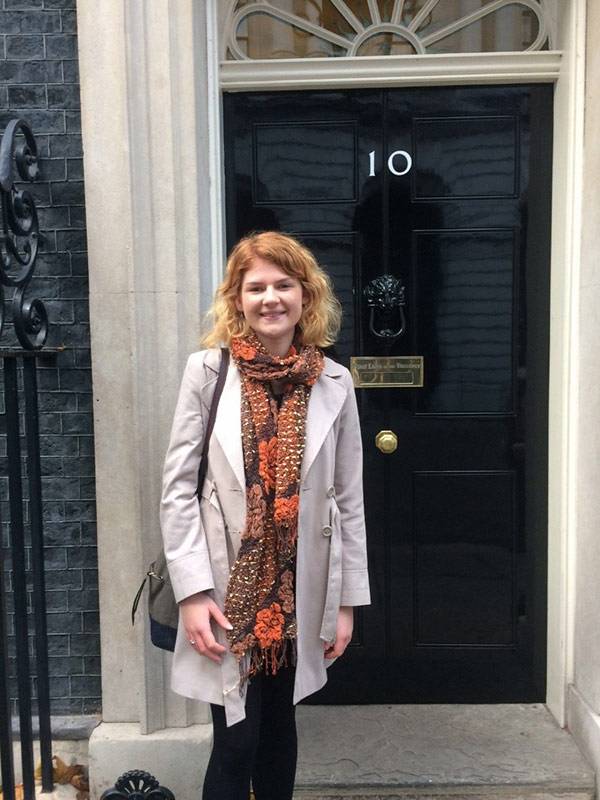Experiencing the frontline of illegal bird slaughter in Cyprus
Guest blog from Georgia Locock

In the distance, the sweet call of the blackcap was being projected through an MP3 decoy. It was 3am and five of us were trudging over a ploughed field in the direction of the tape lure and as we approached a shrubby area, the noise got louder and louder. We were in an area known for bird trapping.
The island of low trees and shrubs within an area of open fields, where the traps were set, was around 200 metres from a house. We couldn’t afford to make any unnecessary noise. As one of us went to stand-by in case the trapper came back, we all began looking for limesticks. Speed and efficiency was everything.

This was my first time out in the field since arriving on Cyprus. Most British tourists visit for its hot climate, beaches and nights out. Instead, I was holding a Lesser Whitethroat smothered in the paste of a limestick. Its head was wrapped around the stick, with its beak embedded. It was pitch black, we couldn’t use torches as we’d attract too much attention. Instead, we carefully shone a dim light to work out what state the bird was in and where to start in an attempt to release it. Submerged, it seemed there was little chance. The bird had seemingly been stuck for a long time, but it persisted with the odd twitch. Like a snare, the more it tried to escape and pull itself away, the more it entangled itself. Its delicate legs were clotted. After a careful extraction, we had removed the bird but it was barely moving. It had been there too long, although the bird was free, its legs were still cemented in the evil substance on the stick. I can’t think of a more brutal way for a bird to die.
Two of the birds rescued on that night were taken back to be cleaned and released. Those doing this work and on the frontline in Cyprus are the Committee Against Bird Slaughter (CABS). Volunteers from CABS spend tireless amount of time rescuing birds from trapping sites and fighting against illegal bird slaughter not just in Cyprus but across Europe. Back in September, I spent six days on Cyprus investigating and learning more about the illegal slaughter of migratory birds that pass over the island.
That night we collected around 150 limesticks. The limesticks are made using a small stick, about the right size to place in a bush, then covered in an incredibly strong and sticky substance which acts as a glue to trap birds when they land on the stick. Trappers will place multiple sticks within an area alongside an MP3 player as a decoy, which usually plays the song of Blackcaps. Such calls attract birds to the area, where they then find themselves surrounded by limesticks. Once stuck, they wait until they’re released by the trapper the next morning.
This illegal trapping then continues when the birds are sold onto restaurants where they’re sold for large amounts of money to be eaten by Cypriots as a traditional, but illegal, ‘delicacy’ known as ‘Ambelopoulia’. This black-market trade has been illegal for over 40 years, yet it continues as many Cypriots still believe the practice to be traditional and it is big business for some trappers. Back in 2016, on British Military Base in Cyprus, it was estimated that 800,000 birds were killed during the autumn using limesticks and mist nets.
On another evening, just myself and a CABS volunteer were investigating the sound of a distant decoy. The mix of emotions was bizarre: it was exciting to find a trapping site and taking immediate action, along with being a part of a CABS mission. But it was also terrifying. We were darting across an open landscape of ploughed fields between shrubs at 2am with trappers nearby. It has become a dangerous job for some CABS volunteers, when we were on Cyprus, groups were threatened with knifes and at a site just a week before, others were kidnapped and others shot at. Nevertheless, when illegal bird slaughter is taking place, they do anything they can to fight it.
There are two British Military Bases on Cyprus, these are Akrotiri and Dhekelia. Along with spending time in the Republic, we spent most of our time on Dhekelia, which has been renowned for many years for the extensive illegal hunting which takes place here. This has created a lot of pressure on the British sovereignty as they are responsible for the crime taking place and up until recently, they were accused of doing very little about the situation. As I have already stated, in the autumn of 2016, 800,000 birds were illegally slaughtered on British land.
However, change is being seen. CABS stated that just compared to 2016, there had been a decrease in the amount of trapping sites that they were finding each night. This was both in the Republic and on British Military Base. Speaking to the police, their attitude has also changed. They seemed keen to reduce and rule-out illegal bird trapping on their land, and this has been made obvious by clear results so far and methods they are evidently putting into place. For example, the use of drones with cameras to deter and gather evidence to prosecute trappers and removal of acacia trees and irrigation pipes.
Further change needs to be happening in the Republic though. Political will is needed. More prosecutions are needed, especially prosecutions against those restaurants who are selling Ambelopoulia.

It is widely believed that to thaw this tradition out, educational action is key. We went to visit Birdlife Cyprus who are acting in schools with educational programs and approaches to children. They have done this through numerous ways, from lesson plans to board games where children can learn about the birds they see. It is all with the intention of teaching and helping them to appreciate the bird life they see and respect this rather than believe that tradition is more important. Unfortunately, still, it is a difficult task as the trapping is very much traditional and passed down through generations. Nevertheless, it was amazing to see the work that Birdlife Cyprus are doing and to hear from their experiences. After a few bleak days of being on the front line of this horrendous slaughter in Cyprus, to learn and hear about this sort of progress was amazing.
Although there is a lot of bleakness in all of this, change is happening. The police on British land are taking action, CABS are going strong and education is being taken seriously. Along with those British tourists attracted to its beaches and hot weather, Cyprus also attracts many birders. Whilst on Cyprus, I did get the chance to see some exciting species. It was very odd to think how brilliant it was to see some species, then compare it to the state I’d seen others when attached to limesticks. Especially after CABS volunteers rescued an adult male Masked Shrike. I’d dreamt of seeing one for a long time, but this one was looking back at me from within a bath tub after having its feathers unmated from the sticky glue of a limestick. The mixture of shear excitement and anger was a strange combination.
Whilst on Cyprus, I created three short films that are aimed at younger audiences in the UK to explain to them about the situation. Although this may seem like an issue that shouldn’t affect children in the UK, the films are made in the hope of igniting the discussion of wildlife threats from around the world. You can view these videos below:
Episode 1: https://www.youtube.com/watch?v=aI5s1V3EPYo
Episode 2: https://www.youtube.com/watch?v=WDK8D3Nze3c
Episode 3: https://www.youtube.com/watch?v=vs1pL7b1njM

Georgia Locock is a young conservationist and blogger and is currently studying at the University of York. You can read Georgia’s excellent blog here
